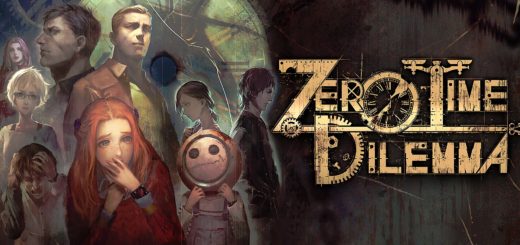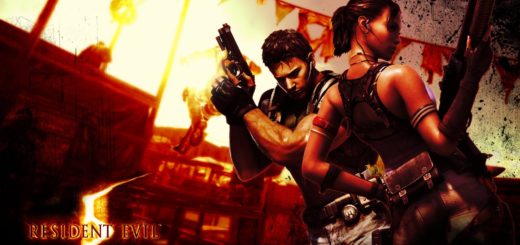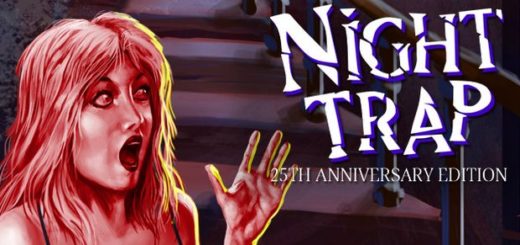ASSASSIN’S CREED: ORIGINS Review
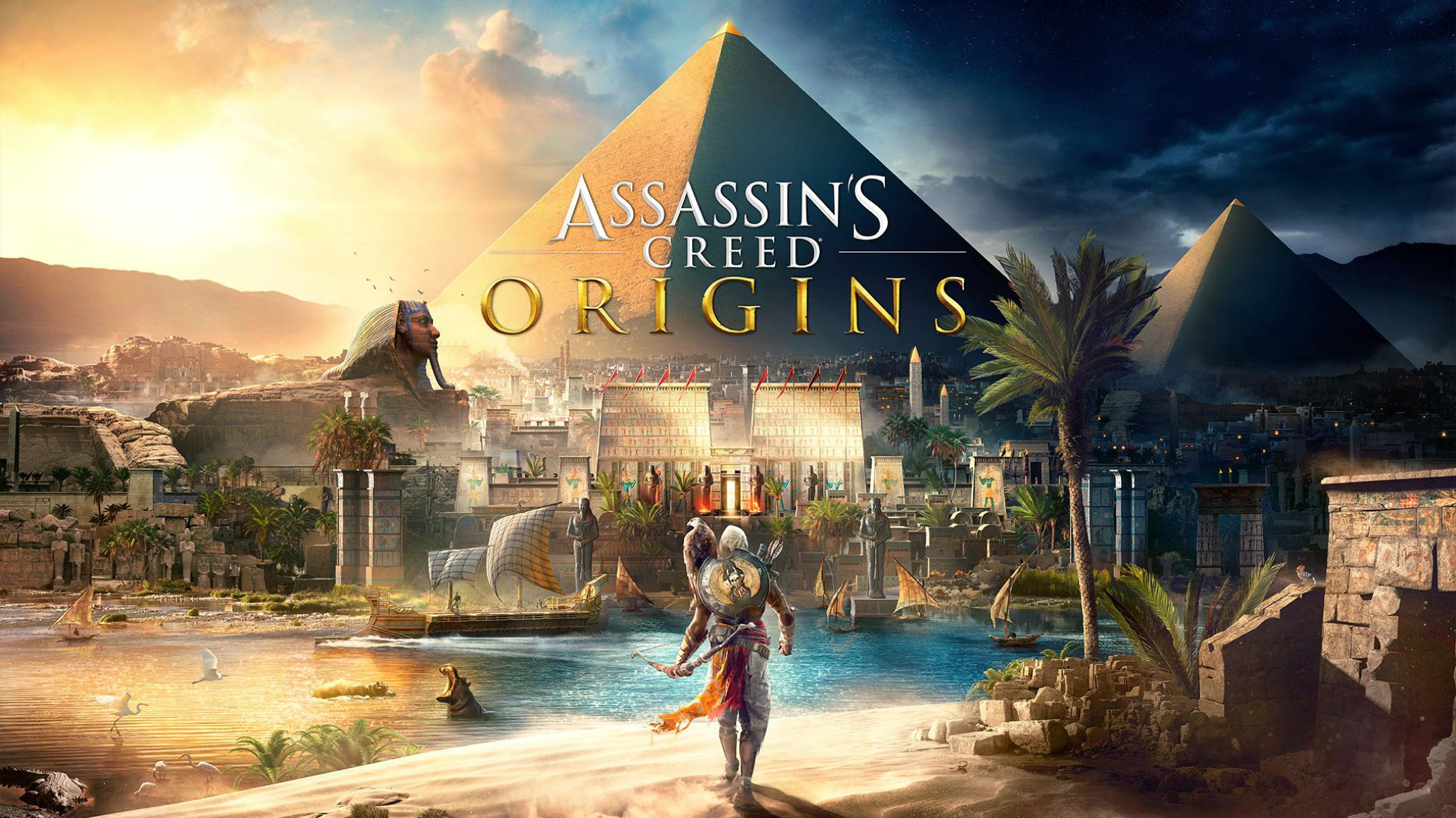
Why do you want to play Assassin’s Creed? Like really, why? I remember when a new Assassin’s Creed game would be THE exciting news out of a video game convention. People lost their shit when you got a second hidden blade, a flying machine, boats, the American Revolution, boats again. But then we got tired. And the world has changed a lot since we last had an Assassin’s Creed game. It’s been almost two years, but the industry has lived like, 10, and the world a collective 1,000, especially in the last year. So what happens when ASSASSIN’S CREED: ORIGINS comes out, strategically timed to drop before Call of Duty, but on the same day as an insane Mario game? Well . . . you sort of attend a funeral.
I ask why you’d play, because after dropping a modest amount of hours into this one, I’m not sure I personally have a good answer to that question. At least not one that is engaging, politically, intellectually, or otherwise. Because ORIGINS is just fine. Often quite good. You kill people. There are missions. You pet cats. Sometimes you pilot a bird like a drone. There’s something about the Knights Templar or the not-yet-the-Templars so they’re called The Order of The Ancients. You parry and block, block and parry. You alternate light and then heavy attacks. It’s all very familiar. The new stuff, of which there is a lot, includes an entire RPG system. Also introduced to the Assassin’s Creed series is the concept of levels: levels for you, levels for pretty much every single weapon you carry, but most importantly (in my heart), levels for your bird drone Senu.

(Note: I think Senu might be one of the eagle’s from Ubisoft’s other eagle-centric VR entry EAGLE’S FLIGHT, but it has yet to have been confirmed given the time travel narrative that it would imply)
This is actually a very big change that brings the series much more in line with its open world contemporaries—in particular, THE WITCHER 3: WILD HUNT. This game is remarkably similar to THE WITCHER 3 from the upgradeable weapons and abilities (various bombs, darts, and melee weaponry) to the role the protagonist plays in the structure of society and the narrative of the game. So like, what’s the problem? Well, it could be the story.
The protagonist of ORIGINS is Bayek, a Medjay from the territory of Siwa and someone I would consider at this moment in time to be the ultimate Revenge Dad. The video game industry has been in its dad phase of psychosexual development for a while now, so it only makes sense that that would eventually trickle into a new Assassin’s Creed. The main difference between Bayek and the other dads of the video game world (Kratos need not apply) is that he actually seems to be a good father. The game takes special care to have him interact with children often (in particular his son’s friends) to show how caring, understanding, and fun he is. Of course, he wouldn’t be a Revenge Dad without a reason for revengeance—enter the aforementioned Order of The Ancients, who have set up camp in one of Siwa’s temples to search for an ancient artifact which longtime Assassin’s Creed fans will recognize as The Apple of Eden, a mind control orb made by an alien precursor race who may or may not be what ancient mythologies call “gods.”
Long story short, Bayek’s son gets caught up in The Order’s plans, is killed as a way to get to Bayek, and Bayek and his wife Aya (the true badass of this game) are given a reason for revenge. So they then set off to take down a cabal of masked, animal themed proto-Templars and get tangled up in Egyptian, Greek, and Roman politics. There’s absolutely nothing wrong with this revenge plot. It’s fine, even if it’s delivered bizarrely, started in media res, and told with layers of flashbacks and weird sideways, visions, and memories. I think this was an attempt at being cinematic, but it comes off as sort of confusing, even if it’s entertaining in a pulpy way. Sure it would have been boring told linearly (essentially functioning like every Assassin’s Creed plot), but it would have at least been a bit easier to understand this world or its characters. Regardless, the plot’s real reason for existing is to tell a prequel story (Bayek is the First Assassin, as the game would like to suggest to you, often) and to set up ways for you to do stuff in the open world. It’s that world that’s the biggest positive.
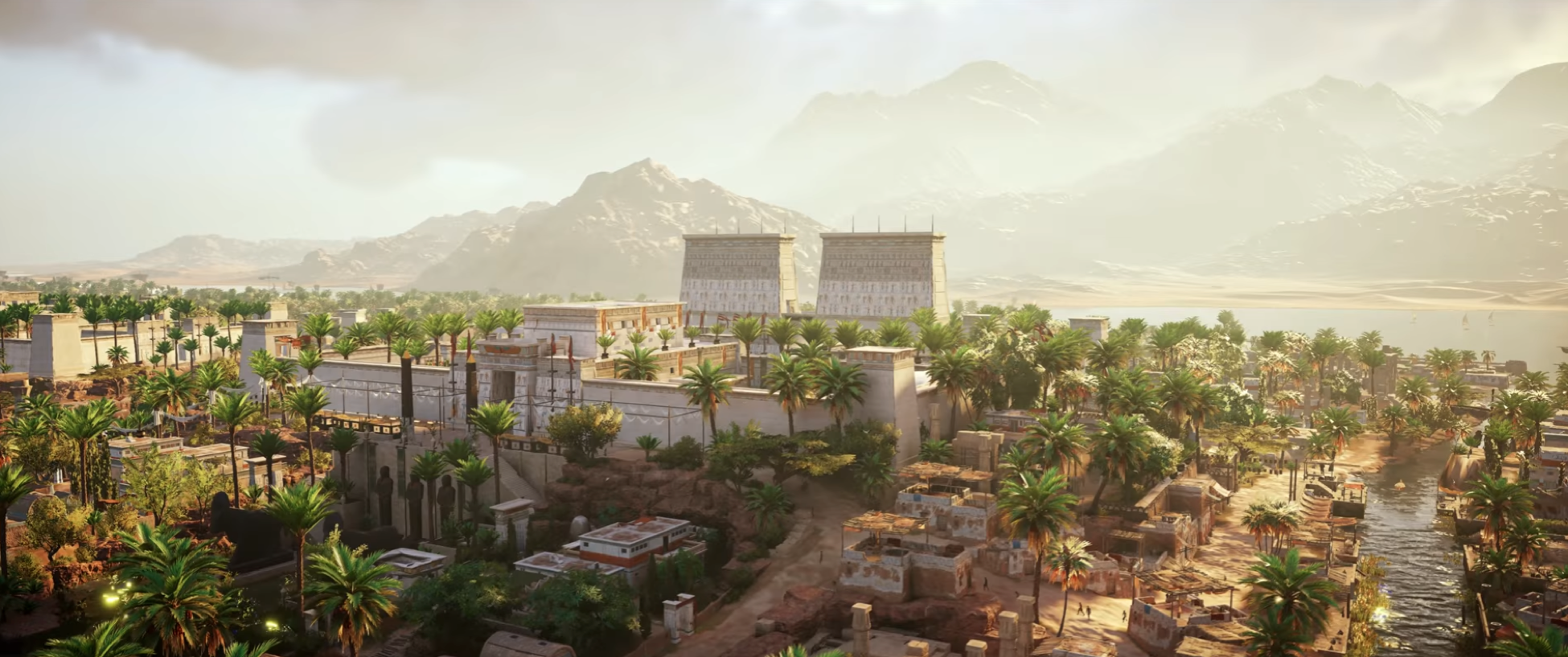
Big Textures, Big Pretty
This vision of Ptolemaic Egypt is beautiful. Not just because it has big 4k textures (it’s one of the few “launch” games for the Xbox One X), but also in all of its little bits and pieces of design. This is as much a living, breathing world as any game world that has been described as such, and one that I think most people haven’t had to imagine, like, ever. When the average person thinks of Egypt they think of the Pyramids at Giza, mummies, and maybe The Sphinx. They don’t think of small fishing communities living by the Nile, or Greek architecture surrounding the library of Alexandria, or ancient temples restored with dumb Mediterranean money. This game provided a view of Egypt I’ve never really imagined and it still ends up being fun to navigate, even without the towering European architecture of previous games. It also helps to convey the political and cultural reality of Egypt at the time, the fusion of Egyptian and Greek styles, and the sort of gross colonial elements that spread throughout Egypt as Greek and Roman money tried to influence politics through covert methods and, ultimately, force. Beyond the small details, this is a gigantic world, filled with treasure to find, bandit camps to dismantle, and various side missions to pursue. It uses the Ubisoft model of open worlds, something that spread throughout the industry when it was born in Assassin’s Creed and refined in Far Cry. Basically, the approach of stuffing the world with too many things to do, giving a vague reason to do them (levels or political influence or “building a Brotherhood”), and letting the player decide how much or how little they do to move onto the next story mission or the next major goal. That’s the really weird thing about ORIGINS; it is almost certainly the most refined version of the Assassin’s Creed experience yet, but in doing that, it became more like the games that were inspired by it.
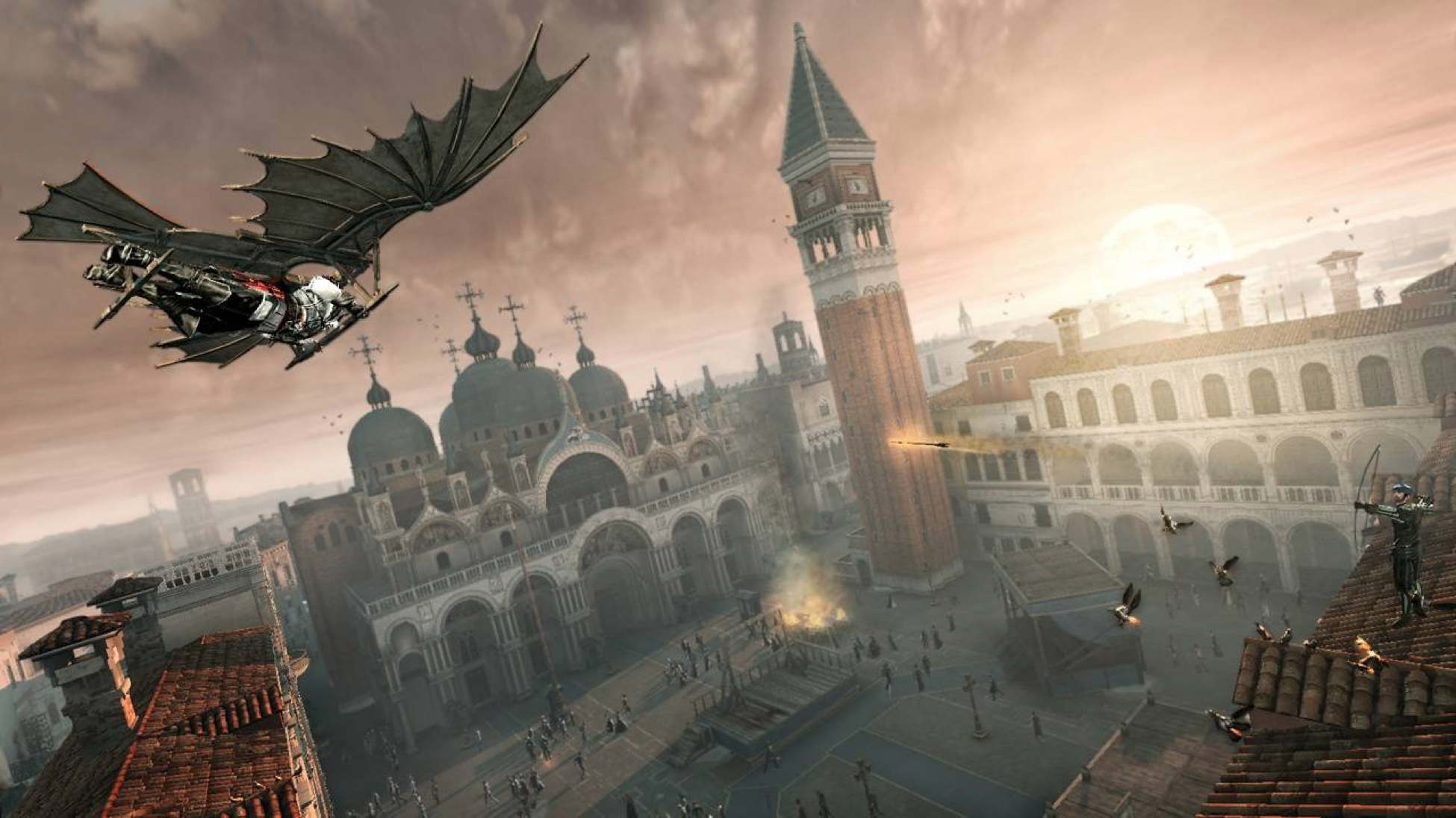
The love affair with Ezio Auditore was real, but that Da Vinci magic was never recaptured
Five-to-seven years ago, ASSASSIN’S CREED: ORIGINS would have been the AAA game with one experimental gameplay element that could have moved the genre in a new direction. Now it’s that old dad you love to visit occasionally; he’s learned to use his iPhone and maybe he’s even made a Twitter account, but he’s still out of step with the world. It’s hard to release an open-world game in a year that’s already seen THE LEGEND OF ZELDA: BREATH OF THE WILD, let alone be proud of it. So when I say ORIGINS feels like a funeral, that’s what I mean. The time for Assassin’s Creed to be at the forefront of video games is over. It’s done. This is probably one of the best historical figure killing games they’ve ever released (though not one of the best cat petting simulators), but it’s not going to change the world. To attempt to answer my question from the start, I think you play ASSASSIN’S CREED: ORIGINS because you want comfort food. ORIGINS is the Thanksgiving leftovers of video games. A mish-mash of good mechanics and good story elements from games that have come out in the last two years, delivered in a lukewarm package that still ultimately tastes good, even if it’s not too original. I think that’s fine. We’ll keep getting Assassin’s Creed games until the sun dies and I bet they’ll keep being just fine, just don’t expect a revolution (you would have had to play ASSASSIN’S CREED III to see that *winks*).
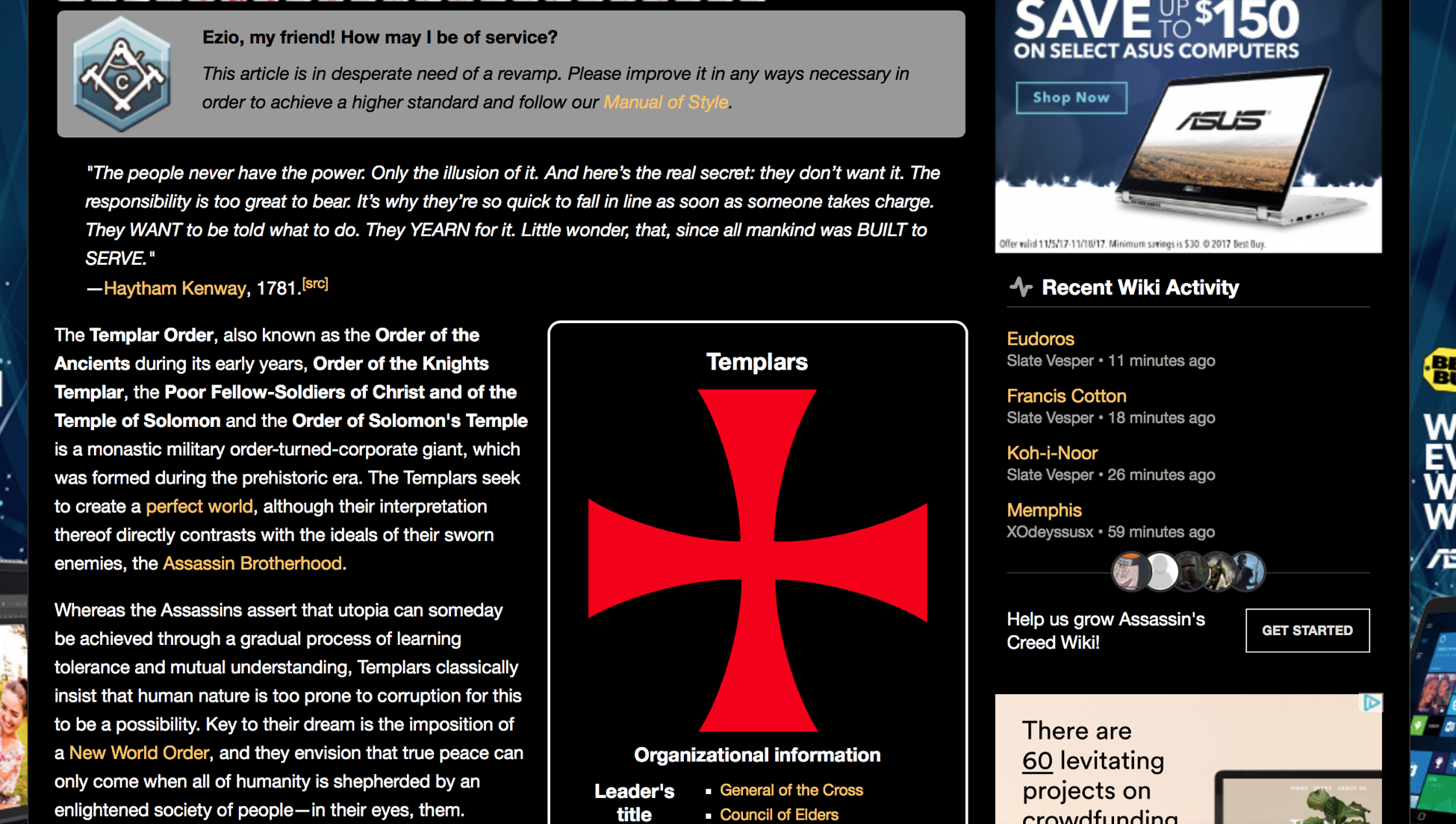
One only has to visit the Assassin’s Creed Wikia to know how crazy these games COULD be
Image Source
In my dream world, Assassin’s Creed would have become the Fast and Furious of video games. It would have leaned into its mythology in just the right kind of way (ORIGINS makes the ASSASSIN’S CREED movie canonical, which is definitely a step in the good-kind-of-crazy direction), had competent gameplay, featured big personalities, and even bigger historical figures to kill. In a world where Ubisoft remains a healthy, profitable company not constantly at risk of a hostile takeover, I think that is still possible. ORIGINS is not that game, but that doesn’t mean you shouldn’t play it, okay?
Verdict: Recommend
Reviewed on PlayStation 4, available on Xbox One, and PC

